We are already one year into the new European patent and court system – a year of eagerly watching and waiting to see how the Unitary Patent (UP) and the Unified Patent Court (UPC) – especially the latter – will be received. After decades of back-and-forth, expectations were high. There were the inevitable teething problems, and the Case Management System (CMS) still poses (avoidable?) challenges for almost everyone involved.
What progress has been made in these first 12 months? [1] And what can we expect in the near future?
New members
Up until 16 April 2024, it looked as though Ireland would be the next EU member state to join the system. However, the referendum planned for 7 June 2024 to ratify the UPCA was postponed on account of the upcoming national and European elections.
Just in time for the UPCA’s first anniversary, however, came good news: Romania ratified the UPCA on 14 May 2024 and submitted its instrument of ratification on 31 May 2024. As of 1 September 2024, it will therefore become the 18th contracting member state of the UPCA.
Unitary Patent
Thanks to the daily updated figures that the EPO makes available on its website (Dashboard for the Unitary Patent), it is very easy to track the development of the Unitary Patent and its acceptance by patent applicants.
The overall picture after one year is positive: the expectations for the Unitary Patent and its take-up figures have been met or exceeded for both 2023 (expected 17%, actual 17.3%) and 2024 (expected 20%, currently 24%).
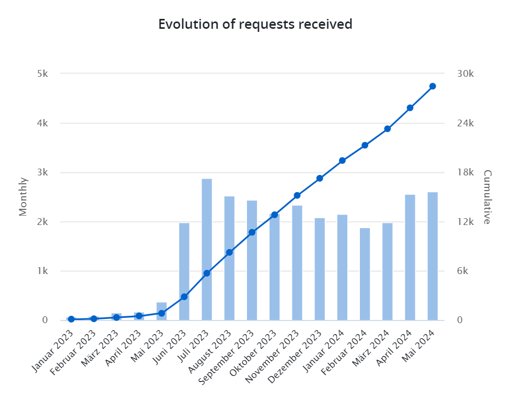
Fig. 1 – Development of UP application figures in the first year; source: https://www.epo.org/en/about-us/statistics/statistics-centre#/unitary-patent
There is no significant backlog in the processing of applications (2.5%), and only very few applications (0.1%) were rejected or withdrawn. Most of the applicants are from Germany, followed by the USA, France and China. The most strongly represented technical fields are medical technology (12.1%), civil engineering (5.7%), measurement technology (5.4%), transport (5.3%) and pharmaceuticals (3.7%).
We can expect that as user confidence in the UPC (which is responsible for Unitary Patents without exception) grows, the willingness of filing a request for unitary effect for a granted European patent will also grow.
UPC representatives
In the first year, 9,673 professional representatives registered with the UPC, of which 1,059 were lawyers and 8,593 patent attorneys. The large preponderance of patent attorneys (90 %) is not surprising, as it corresponds to the general ratio of the two professional groups in Europe. Of the registered patent attorneys, around 84% took advantage of the so-called grandfather rule (Rule 12.1 of the EPCL Rules), which applied until 3 June 2024.
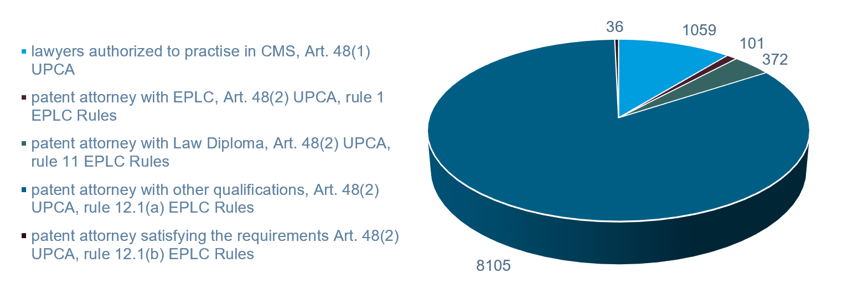
Fig. 2 – Overview of representatives listed with the UPC
Included among the representatives admitted are quite a few British patent attorneys and lawyers, but also some lawyers from Spain and Poland (see also JUVE of 9 June 2023).
Opt-out / opt-in
During the sunrise period, 415,810 opt-out applications were filed, mainly for European patents that had already been granted. The numbers then fell back considerably and now average 3,500 per month. This corresponds to approx. 40% of European patents granted per month (2023).
On the other hand, 290 opt-out applications have so far been withdrawn (so-called opt-in), which, despite the comparatively low number, can certainly be seen as a sign of a gradual build-up of trust in the new court. It is not uncommon for the patent in question to be the subject of an application for provisional measures (in 43% of cases) or an infringement action (in 33% of cases) before the UPC a short time later.
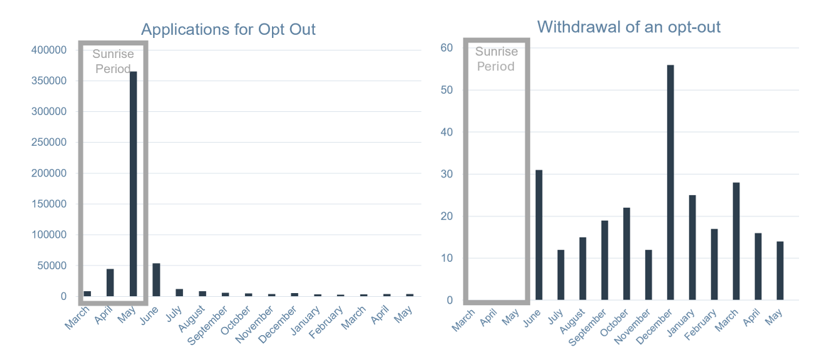
Fig. 3 and 4 – Development of opt-out and opt-in applications in the first year
Case load
Since December 2023, the UPC has published monthly updates on its website on the court’s workload and case distribution. According to the last publication of 30 May 2024, a total of 373 proceedings were pending before the UPC in the first year. These included 134 infringement proceedings, 63 of which involved a total of 165 counterclaims for revocation, 39 revocation proceedings, 26 applications for provisional measures, 5 applications for preserving of evidence, 1 application for an order for inspection, 1 request for damages and 2 applications for declarations of non-infringement. The proceedings are divided up among the chambers of the Court of First Instance as follows:
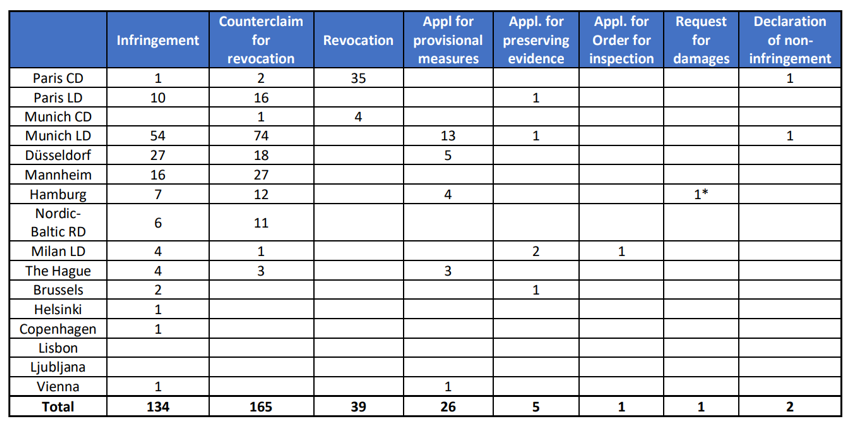
Fig. 5 – Overview of the distribution of proceedings pending before the Court of First Instance in the first year; source: UPC news 30 May, 2024)
Note: However, these published figures do not always match the hits found using the case search option on the UPC website or through the CMS (in both, for example, only 125 infringement proceedings were listed up to 3 June 2024). The in some cases considerable deviations are probably due to procedural or processing-related delays (service of applications/claims).
The vast majority of patent infringement proceedings were brought before the 4 German local divisions, led by Munich and Düsseldorf, followed by the Paris local division, the Nordic-Baltic regional division and the local divisions of The Hague and Milan.
The high number of revocation counterclaims is due to the fact that, until recently, if there were several infringing defendants in a case, each defendant had to file a separate counterclaim for revocation. Following an amendment to the CMS published on 5 April 2024, happily it is now technically possible to file a joint counterclaim for revocation.
Judges
Given that proceedings have so far focused on the German local divisions in particular, two additional legally qualified judges were appointed in spring 2024: Mr Dirk Böttcher was appointed to the local division in Mannheim and Mr Daniel Voß to the local division in Munich. In addition, the Munich local division was expanded to include a second panel with Ms Ulrike Voß (already a judge at the Munich central division) as presiding judge and Mr Daniel Voß.
In addition, in anticipation of the opening of the 2nd section of the central division in Milan on 26 June 2024, three new judges were appointed: Mr Andrea Postiglione (IT), Ms Anna-Lena Klein (DE) and Ms Marije Knijff (NL).
This means that there are currently 111 judges working at the UPC, 43 of whom are legally qualified and 68 of whom are technically qualified. With 37 judges, Germany accounts for the largest proportion of the judges, followed by France (17), Italy (13), the Netherlands (10) and Sweden (7).

Fig. 6 and 7 – Nationality of legally (left) and technically (right) qualified judges
Language of the proceedings
It was only at the proverbial last moment, i.e. a few days before the UPCA came into force, that Germany, France and Italy decided to accept English as an additional language of proceedings for their local divisions. This meant that proceedings could be conducted in English at all divisions of the Court of First Instance from the outset. Nevertheless, until March 2024, German was the predominant language of proceedings in all first-instance proceedings, which can be explained on the one hand by the high number of proceedings brought before the German local divisions and on the other hand by the early uncertainty as to whether English will be the language of proceedings in all countries. English became the predominant language of proceedings for the first time in April 2024 and currently accounts for 50% of all proceedings. It can be assumed that this trend will continue and probably even increase.
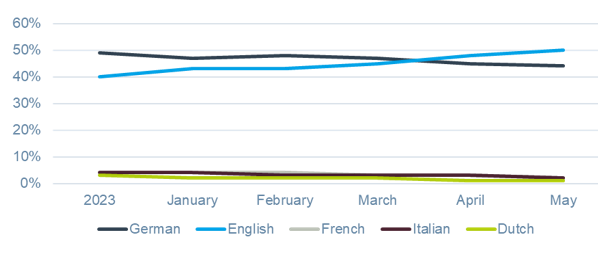
Fig. 8 – Languages of proceedings at the Court of First Instance in the first year
Provisional measures
Of the 23 applications for provisional measures that can currently be researched, 10 were or are being conducted in German and 13 in English (9 of these before the German local divisions). Only 3 proceedings were decided ex parte on the grounds of exceptional urgency (2 (partial) grants, 1 rejection); all others were and are being conducted inter partes (up to now 4 grants, 5 rejections, 1 rejection after appeal). In 13 of the proceedings, the opposing parties had filed protective letters.
37% of the underlying patents are European patents “left in the system” and a remarkable 42% are patents that were only returned to the jurisdiction of the UPC by opting in after an earlier opt-out. Approx. 20% of the proceedings are already based on Unitary Patents.
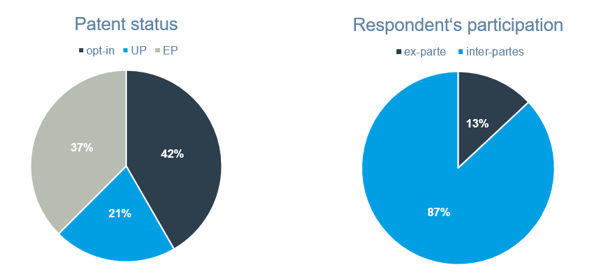
Fig. 9 and 10 – Status of patents and participation in summary proceedings in the first year
It is very much to be welcomed that a technically qualified judge has been appointed in almost all proceedings.
The average duration of inter partes proceedings at first instance is only 3.7 months, usually with concurrent summary examination of infringement and validity of the patent. The only appeal proceedings brought to a close to date took only 5 months.
Infringement actions
Of the 125 infringement proceedings that can currently be researched, German is still the predominant language of proceedings (61 cases), closely followed by English (55 cases, 38 of which were brought before the German local divisions). In April and May 2024, however, the majority of actions filed with the German local divisions were also filed in English, which corresponds to the general trend shown above.
Although the majority of infringement actions still relate to European patents that have not been opted out (69 proceedings), an increasing number is based on patents that have been returned to the jurisdiction of the UPC through opt-in (42 proceedings) and Unitary Patents (14 proceedings).
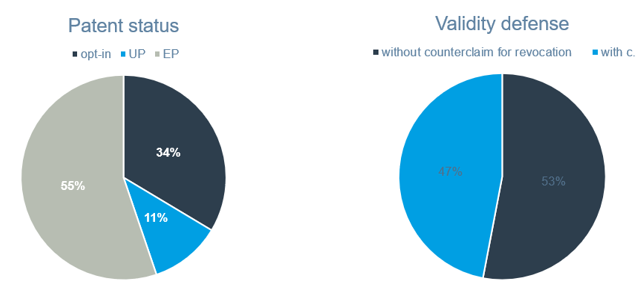
Fig. 11 and 12 – Status of patents and proportion of proceedings with revocation counterclaims in the first year
Bifurcation. In 63 infringement proceedings, a total of 165 counterclaims for revocation were filed in the first year, so that the question arises as to how the local divisions deal with Art. 33(3) UPCA. In relevant cases, the local divisions of Düsseldorf, Munich and The Hague have already decided against a so-called bifurcation and in favor of a joint hearing of infringement and validity aspects before the respective local division pursuant to Art. 33(3) lit a.) UPCA.
Duration of proceedings. The average duration of proceedings in first-instance infringement proceedings is difficult to estimate as only two oral hearings were held by the end of May 2024. In these and the proceedings scheduled to date, the time period between the filing of the action and the oral hearing is between 9 and 11 months and 12 months in only 2 cases. It can therefore initially be assumed that the timeframe – completion of the first instance within one year – will be largely adhered to.
Revocation actions
Of the 32 revocation actions currently searchable, 4 are directed against Unitary Patents, 4 of the patents concerned were returned to the jurisdiction of the UPC by opt-in (parallel infringement proceedings are pending). Parallel opposition or appeal proceedings are pending before the EPO for 15 patents.
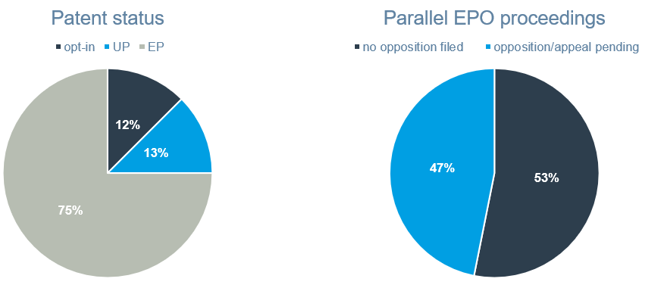
Fig. 13 and 14 – Status of patents and proportion of patents with pending EPO proceedings in the first year
Stay of proceedings. In two proceedings to date, the central divisions in Paris and Munich each decided not to make use of the possibility of staying revocation proceedings under Art. 33(10) UPCA, as a rapid decision by the EPO was not to be expected in either case. At the time of the decisions, the oral hearing on the opposition in one case (Munich) was scheduled for about 4 months later and in the other case (Paris) not yet scheduled. The Court of Appeal confirmed the decision of the Paris central division, as the oral hearing on the opposition, which had in the meantime been scheduled, would not have taken place until more than 4 months after the oral hearing on the revocation action.
Both on the question of the staying of a revocation action and the joint hearing of infringement and counterclaim for revocation, the court thus shows a clear intention to wind up the proceedings in the first instance within the targeted one-year period and not to prolong the proceedings by stalling or delaying them.
Orders and Decisions
The first year was characterized by a large number of procedural orders and interim decisions. However, some initial decisions were also made in proceedings on the merits which, due to the short duration of the proceedings, related in particular to applications for provisional measures and inspections. By 3 June 2024, 293 orders (Orders (O)) and decisions (Decisions (D)) had already been published by the court.
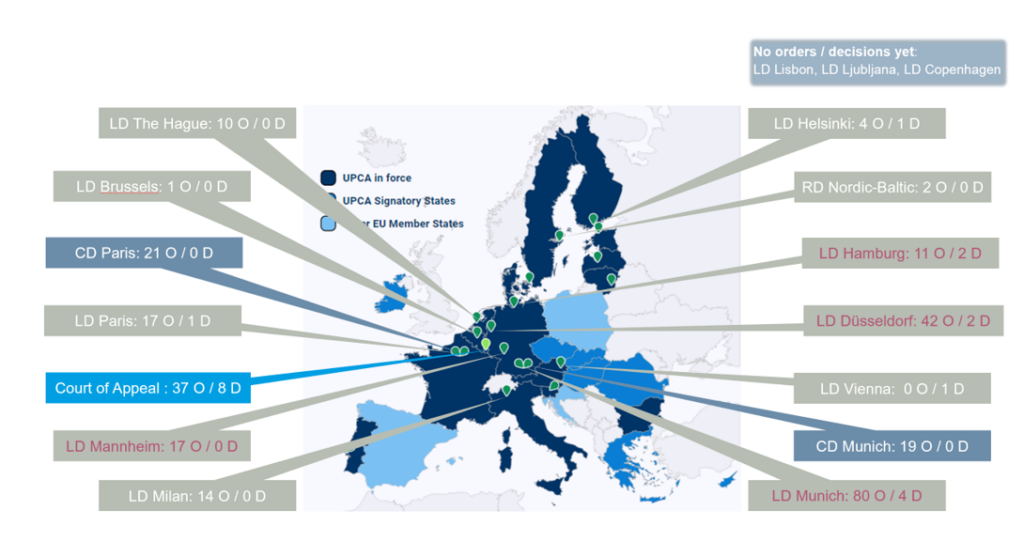
Fig. 15 – Overview of published decisions per division in the first year
Our next article will be dedicated to the key aspects of these initial decisions.
File management – the CMS
The many shortcomings of the CMS, which everyone involved, from the representative to the judge, had to contend with from the outset, will not be discussed here. On a positive note, work on optimizations and responding to user suggestions for improvement is constantly ongoing. For example, the “my legal team” function was introduced in November 2023, which should make it much easier for representatives to manage and process files. Further improvements, e.g. the simultaneous downloading of several documents or the (not to be underestimated) possibility to correct representative’s data, were introduced in December 2023. Finally, since April 2024, it has been possible for several defendants in infringement proceedings to file a joint counterclaim for revocation, which should considerably simplify the previously enormous administrative effort on the part of the court and should also have a positive effect on costs.
What can we expect in year 2 of the EPG?
Expanded territory. On 1 September 2024, Romania will become the 18th member state of the UPCA. Another candidate could be Ireland. According to unconfirmed rumors, Poland is also discussing signing the UPCA, which would be another major step towards uniformity.
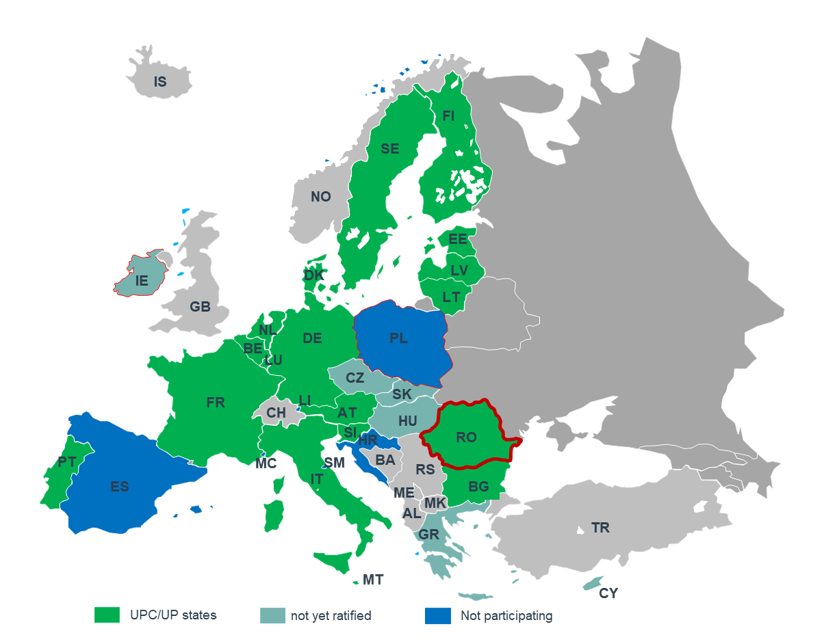
Fig. 16 – UPCA territory as of September 1, 2024
2nd generation Unitary Patent. Also from 1 September 2024, the current Unitary Patent comprising 17 EU member states will be replaced by the 2nd generation Unitary Patent then comprising 18 EU member states, to include Romania.
(Unitary patents granted up to 31 August 2024 (1st generation) continue to exist unchanged; a later extension of the territorial scope is not possible.)
New section of the Central Division in Milan. The second section of the central division in Milan will take up its work on 26 June 2024. As a result, the technical competencies within the central division will shift slightly once again: IPC Class A will be taken over by Milan, while Munich will retain responsibility for Class C. However, responsibility for supplementary protection certificates for classes A and C will pass to Paris.
Representatives. Since 4 June 2024, European patent attorneys can only register as UPC representatives upon presentation of a European Patent Litigation Certificate (EPLC). So far, 4 EPLC courses offered by CEIPI in Strasbourg (FR), the Distance Learning University of Hagen (DE), Maastricht University (NL) and Heinrich Heine University Düsseldorf (DE) have been accredited.
Case law. Around 60 first-instance decisions on infringement actions and around 20 decisions on revocation actions are expected by the end of 2024; in addition, important decisions will be made by the Court of Appeal, in particular on the jurisdiction of the UPC. It is hoped that after the second year of the UPC’s existence, key procedural and substantive issues will have been clarified, at least at first instance.
→ can be read here soon: One year of UPC case law at a glance.
[1] The following figures and statistics are as at 3 June 2024.

